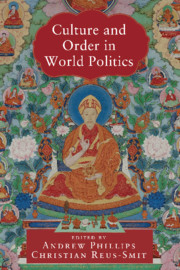Book contents
- Culture and Order in World Politics
- LSE International Studies
- Culture and Order in World Politics
- Copyright page
- Contents
- Additional material
- Contributors
- Preface
- Part I Introduction
- Part II Historical Orders
- Part III The Modern ‘Liberal’ Order
- Part IV Constitution and Contestation
- 10 Universal and European
- 11 The Jewish Problem in International Society
- 12 Recognizing Diversity
- 13 Gender, Nation and the Generation of Cultural Difference across ‘The West’
- 14 Governing Culture ‘Credibly’
- Part V Conclusion
- References
- Index
13 - Gender, Nation and the Generation of Cultural Difference across ‘The West’
from Part IV - Constitution and Contestation
Published online by Cambridge University Press: 25 December 2019
- Culture and Order in World Politics
- LSE International Studies
- Culture and Order in World Politics
- Copyright page
- Contents
- Additional material
- Contributors
- Preface
- Part I Introduction
- Part II Historical Orders
- Part III The Modern ‘Liberal’ Order
- Part IV Constitution and Contestation
- 10 Universal and European
- 11 The Jewish Problem in International Society
- 12 Recognizing Diversity
- 13 Gender, Nation and the Generation of Cultural Difference across ‘The West’
- 14 Governing Culture ‘Credibly’
- Part V Conclusion
- References
- Index
Summary
This chapter draws attention to the centrality of gender in liberal cultural diversity regimes. It shows that the construction of nations and other cultural groups centrally relies on gender: by helping to generate a sense of familiarity among national/cultural strangers; by serving as a means by which cultural boundaries are drawn between the national/cultural Self and foreign Others; and by assigning women the primary role in the intergenerational transmission of national or ethnic culture. The chapter then challenges claims about a major cultural cleavage on gender equality between 'the West' and 'Islam' by drawing attention to the rise of a transnational constellation of self-identified Western actors that mobilize against gender equality in the name of 'Western' or 'European' civilization. Gender has undeniably become central in mobilizing actors against liberalism. The chapter helps illustrate the editors’ argument that diversity regimes always create social hierarchies, in this case gender hierarchy.
Keywords
- Type
- Chapter
- Information
- Culture and Order in World Politics , pp. 271 - 293Publisher: Cambridge University PressPrint publication year: 2020

